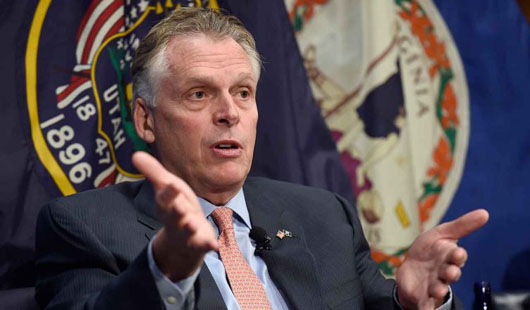by WorldTribune Staff, July 5, 2017
Virginia Gov. Terry McAuliffe, who has vetoed several attempts by the state legislature to clamp down on voter fraud, said he has “no intention” of complying with President Donald Trump’s Commission on Election Integrity.
McAuliffe, a Democrat, insisted there is “no evidence” of voter fraud in Virginia, that the “only irregularity in the 2016 presidential election centered around Russian tampering” and that the commission was set up as a “tool to commit large-scale voter suppression.”

A Republican leader in the Virginia legislature responded to McAuliffe’s intent to ignore the commission by stating that he has observed for years “how hard Virginia Democrats work to protect the maximum potential for voter fraud.”
The commission, headed by Vice President Mike Pence, is scheduled to have its first meeting on July 19.
At least 5,500 noncitizens have been identified as being on Virginia’s voter rolls, the Washington Free Beacon reported on July 1. McAuliffe, whose office did not respond to requests from the Beacon for comment, “has already vetoed numerous attempts this year by the Virginia legislature to limit the possibility of voter fraud in the commonwealth’s elections,” the report said.
Questions on the governor’s own involvement in an election integrity case arose last year after revelations that political backers of McAuliffe made $675,000 in cash and in-kind contributions to the election campaign of the wife of FBI Deputy Director (and current acting Director) Andrew McCabe.
McCabe later led the investigation into Hillary Clinton’s mishandling of classified material.
Virginia State Sen. Dick Black on Oct. 24 called for McCabe to “resign immediately” over the revelations.
In February, McAuliffe vetoed legislation that would have triggered investigations in jurisdictions that had more people registered to vote than people who were eligible to vote.
The legislation followed a report that looked at a sample of just 8 of Virginia’s 133 jurisdictions and found more than 1,000 individuals who were illegally registered.
In March, McAuliffe vetoed a bill that would have required the Virginia Department of Elections to notify local registrars of voters who were registered to vote in other states.
In both cases McAuliffe cited the “administrative burden” that would be put on localities, “which was not an issue for the governor in 2016 when he attempted to rush the restoration of voting rights for more than 200,000 Virginia felons,” the Beacon report said.
Local registrars complained that they had “no forewarning at all” of McAuliffe’s order and were left unprepared to help individuals they were made responsible for.
“We had phones that were ringing off the hook,” said a local Hanover county registrar. “It was really a shock to me and my staff that this was coming.”
“Our concerns were how the process was going to be handled,” said another registrar. “It’s not only been haphazard for registrars’ offices, think of the individuals affected.”
According to the Beacon report, voting rights were restored for 132 individuals that remained in custody because they were deemed “sexually violent predators,” and several violent felons that remained in prison were discovered to have mistakenly had rights restored.
Included were a man that attempted to murder a woman by locking her in a house after lighting a mattress on fire, and another who pointed his gun at a state trooper while fleeing from police by car, the Beacon report said.
McAuliffe’s office excused the mistakes by saying that it was “obviously a massive administrative undertaking” and that it was “working constantly to refine the working administrative database that we’re using to implement this process.”
Republicans called the move “reckless,” but McAuliffe “shielded the order from oversight” by keeping the list of felons confidential and denying Virginia Freedom of Information Act requests despite guidance from the state’s official FOIA council, the report said.
McAuliffe’s attempt to restore all 206,000 individuals’ rights with one order was stopped by Virginia’s supreme court, “but he circumvented their ruling by giving clemency to 13,000 individuals on a case-by-case basis,” the report said.
Letters to the Editor __ Subscribe to Geostrategy-Direct __ Support Free Press Foundation
